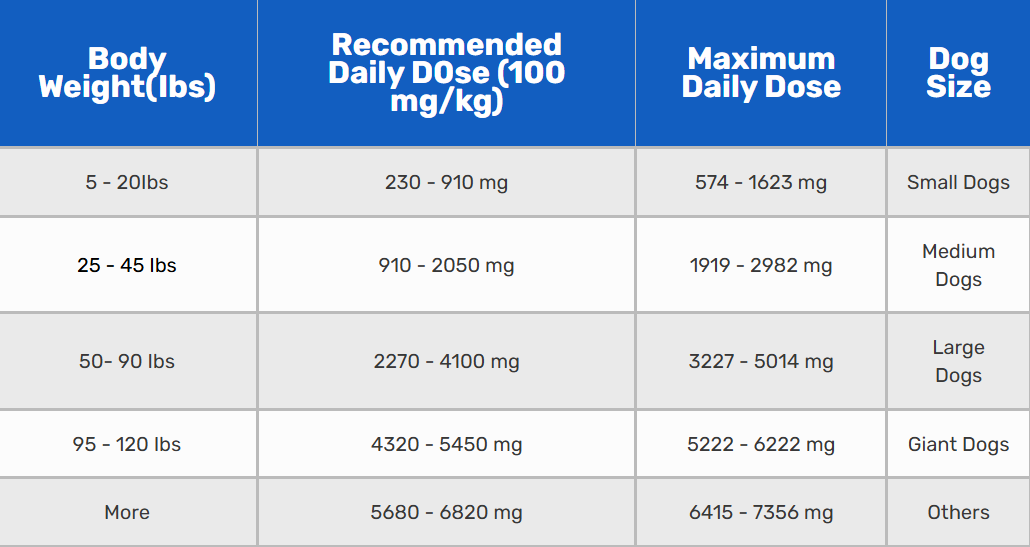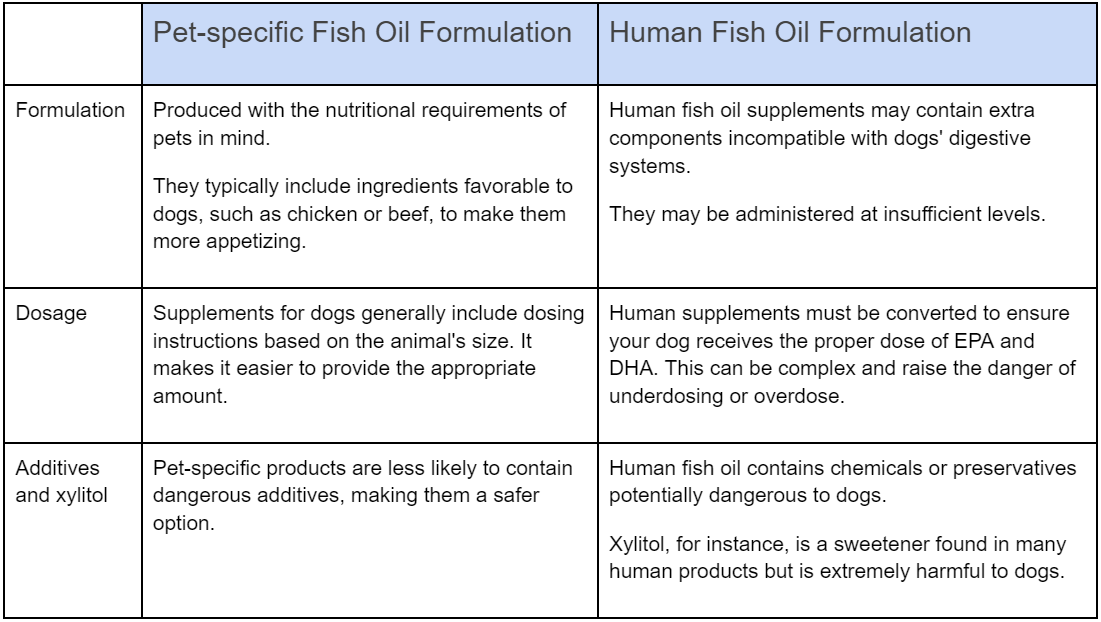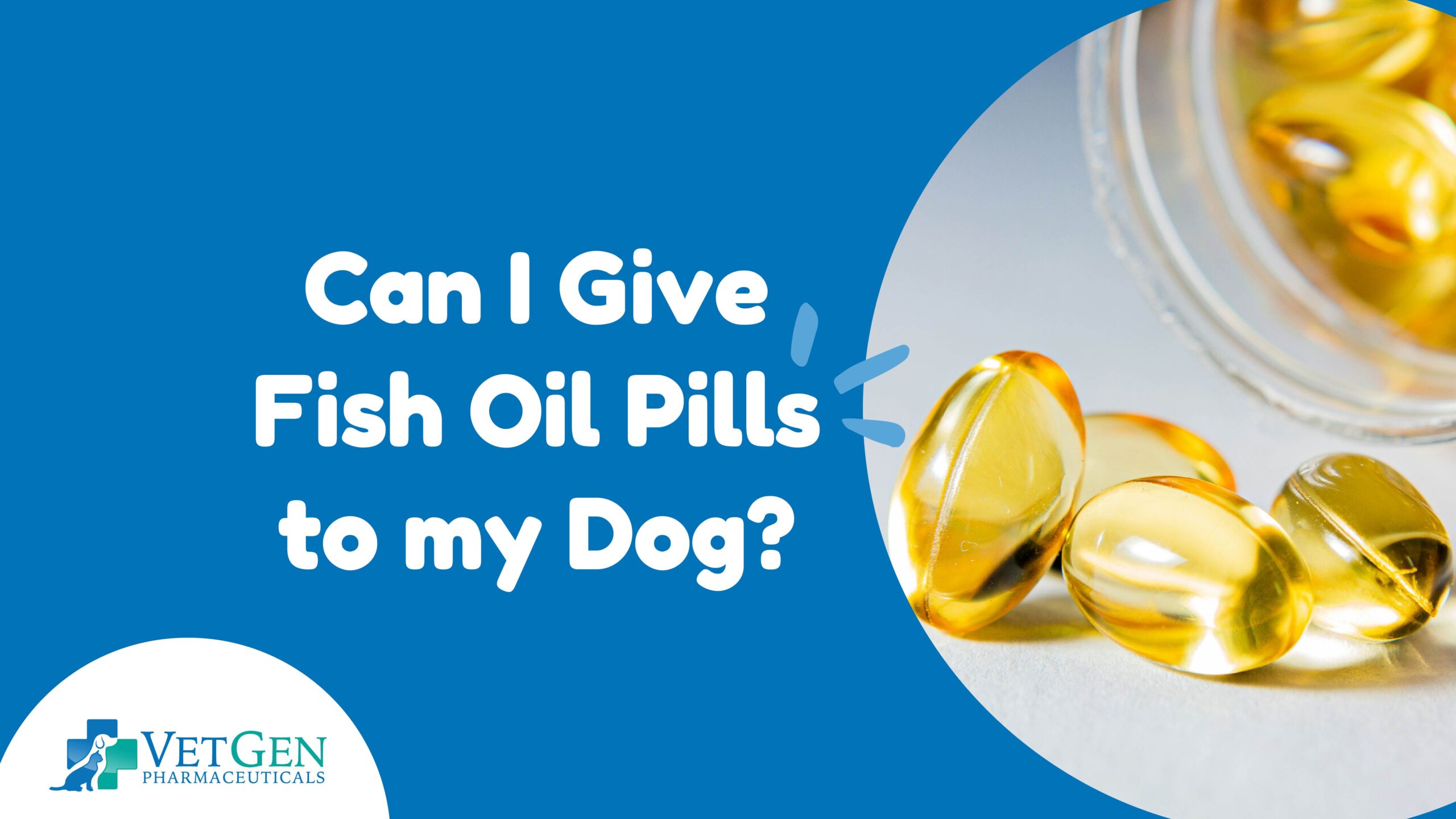The short answer is yes; you can give fish oil pills to your dog.
As a dog owner, one must have come across popular supplements like fish oil. Fish oil is a beneficial supplement for dogs because of its richness in omega-3 fatty acids. It helps with the heart health of the dog along with improving brain function and reducing inflammation.
So, let’s go ahead and learn more about the benefits of fish oil and how it is beneficial for dogs.
The Top 5 Benefits of giving fish oil to dogs are:
Fish oil is especially known for its high content of omega-3 fatty acids. Omega-3s promote a shinier coat and healthier skin. It also reduces irritation and inflammation.
Fish oil is extremely helpful in reducing inflammation. Dogs suffering from arthritis or joint problems can use it to enhance their mobility. By lowering inflammation, they also improve the immune system, making canines more prepared to battle infections and disorders.
As read above, it helps with heart health. Omega-3 fatty acids improve blood circulation in the body. Hence, it lowers the risk of heart diseases in dogs.
Fish oil is vital for older canines since it improves cognitive function and keeps the brain sharp.
How Much Fish Oil Should a Dog Have Per Day?
According to the Canine Arthritis Resource and Education, the usual suggestion for fish oil doses is 75-100 mg/ kg total EPA/DHA daily.
Fish oil dosing is frequently recommended depending on the dog’s weight to ensure an adequate amount for their size.

EPA and DHA concentrations in the fish oil supplement must be noted as they influence the overall dosage.
Types of Fish Oil Supplements for Dogs
Fish oil is available in multiple forms
Liquid Fish Oil is simple to incorporate into your dog’s diet and provides flexible dosing. Fish Oil Capsules are a convenient way to provide fish oil to your dog, especially if they’re used to swallowing pills. Soft Chews are a tasty treat for dogs and are frequently flavored. This form is simpler to administer. Before introducing in your dog’s diet make sure to check EPA and DHA concentrations.
Some fish oil supplements are in the shape of flavored sweets. These are intended to be highly appetizing. Powder Form, Although less frequently used, can also be a variable. It is sprinkled on food. This might be a good alternative.
How Can You Tell if Fish Oil is of High Quality Not?
It’s always best to select supplements that have undergone molecular distillation or a similar purification procedure to eliminate heavy metals and other impurities.
Next, look for the source. Whether the fish oil is extracted from wild-caught or farmed fish. Wild fish often have more omega-3 fatty acids and fewer contaminants.
We should always choose products specifically prepared for pets. They are less likely to include dangerous ingredients. Look for third-party testing and certification from credible organizations. Organizations like International Fish Oil Standards or US Pharmacopeia (USP) might be a few.
Another aspect is to look at is the packaging. Choose supplements in dark bottles or packaging that protects against light and air. Omega-3 fatty acids are susceptible to oxidation, which reduces their effectiveness. There are very few brands that take care of this in their quality check, such as:
Nordic Naturals provides a range of fish oil products made exclusively for dogs. They focus on purity and sustainability.
Zesty Paws offers fish oil supplements in soft chews and liquids. They aim to meet a variety of preferences and needs of dogs.
Grizzly Salmon Oil specializes in salmon oil. It promotes skin and coat health with overall wellness.
Welactin is a well-known brand that makes fish oil supplements high in omega-3 fatty acids. They intend to provide dogs with a variety of health benefits.
Safety and Side Effects of Fish Oil for Dogs
High doses of fish oil may trigger gastrointestinal problems like diarrhea or loose stools. This usually happens when the supplement is introduced too rapidly or in a dose too large.
Omega-3 fatty acids have inherent blood-thinning effects. While it is helpful to cardiovascular health, excessive quantities might raise bleeding risk.
Fish oil sometimes contains heavy metals, PCBs (polychlorinated biphenyls), and other environmental contaminants. Long-term exposure to these toxins leads to health problems.
Some dogs may be allergic to fish oil or certain types of fish. Allergic reactions might emerge as skin irritations, itching, or more severe symptoms.
Fish oil supplements might also conflict with some drugs or worsen pre-existing diseases. For example, they should be used cautiously in dogs with reduced liver function.
Adding it to the diet without altering other calorie sources may cause weight gain in some dogs.
Difference Between Fish Oil for Dogs and Humans
The most basic difference is in the formulation. The table provides a more detailed, in-depth understanding of the supplements.

What is a good alternative to fish oil for dogs?
Few dogs have conditions of fish allergies or sensitivities. Several other alternatives deliver omega-3 fatty acids or equivalent advantages. A few of them are:
Flaxseed Oil is a plant-based alpha-linolenic acid (ALA) source. The body can partially convert into EPA and DHA. It’s good for your dog’s skin. It’s a good choice if he’s allergic to fish.
Krill Oil is like fish oil; it contains EPA and DHA. It is considered more sustainable and less likely to contain mercury or other pollutants. It also includes the antioxidant astaxanthin.
Hemp Oil provides a balance of omega-6 and omega-3 fatty acids. It is good for dog skin and coats. It does not contain EPA or DHA but can promote general wellness.
Green-Lipped Mussel is another marine-based alternative that is high in EPA and DHA. Green-lipped mussels have special nutrients that benefit joint health.
Algal Oil is a vegetarian source of DHA derived from algae, the principal producer of DHA in the marine ecosystem. It is a sustainable option that is appropriate for dogs who are sensitive to fish.
Conclusion
To summarize, fish oil supplements provides several health benefits for dogs. it improves skin and coat health, increases joint mobility, improves cardiovascular function, and cognitive assistance.
Fish oil heavily benefits your dog’s diet if used correctly and in high-quality products. Visit VetGen Pharmaceuticals for additional information on how to promote your dog’s health and well-being.
Frequently Asked Questions
How long does fish oil take to work in dogs?
Fish oil can start showing effects in dogs within 4 to 6 weeks for skin and coat improvements and 2 to 3 months for systemic benefits like reduced inflammation and cognitive enhancements.
Is 1000 mg of fish oil too much for a dog?
The recommended dose of 1000 mg of fish oil for a dog is determined by its size and individual health demands. It may be appropriate for larger dogs but overkill for small ones.
Should I give my dog salmon oil?
Yes, salmon oil can benefit your dog due to its high omega-3 content. Ensure it’s high quality.
Can I use coconut oil on my dog?
Yes, dogs can use coconut oil topically and orally to support skin, coat, and overall health.






